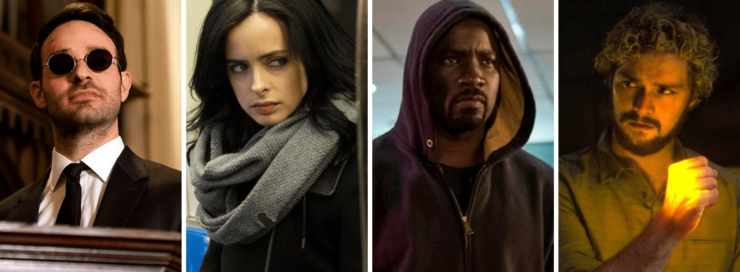When Daredevil debuted on Netflix in April 2015, it set the geek world afire. Having already conquered movie theaters with the various members of the Avengers, the Marvel Cinematic Universe was now taking its more ground-level heroes and trying to do the same on streaming television.
While it started out fantastic—with the first seasons of DD, Jessica Jones, and Luke Cage in particular achieving greatness on multiple levels—it petered out pretty quickly. Part of it was some weaker entrants (Iron Fist season one), part of it was sophomore seasons unable to live up to their debuts (DD and JJ’s second seasons were both steps downward), and a huge part of it was Netflix losing interest in partnering with Marvel once Disney announced their own streaming service. As a result, The Punisher season two and Jessica Jones season three were released this year with minimal fanfare or buzz, feeling for all the world like Netflix was releasing them solely to fulfill contracts.
With the third season of JJ bringing this corner of the MCU to a close, let’s take a look back at the baker’s dozen of seasons we got out of it.
SPOILERS FOR ALL THIRTEEN SEASONS OF MARVEL’S NETFLIX SERIES BELOW!
Daredevil season one
April 2015
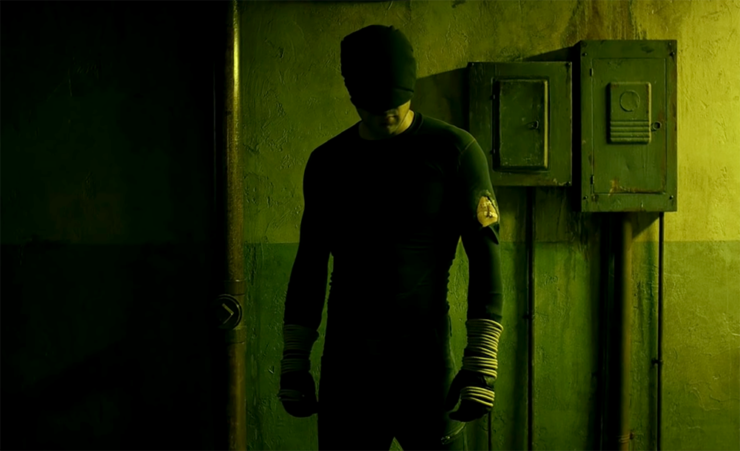
(Reviewed on this site by Emmet Asher-Perrin)
The Good: Almost all of it. Brilliant introduction to the milieu, making excellent use of Daredevil’s long history as well as that of the MCU. One of DD’s iconic runs was the “Born Again” storyline by Frank Miller and David Mazzucchelli and its aftermath by Ann Nocenti and John Romita Jr., when DD was the protector of Hell’s Kitchen through the late 1980s. The problem is that that neighborhood has gentrified in the three decades since, so portraying it as a slum in the 21st century is problematic—but hey, we’ve got the Chitauri invasion in Avengers, which took place in midtown! Problem solved! Now Hell’s Kitchen is back to being a slum thanks to superheroic property damage, and Wilson Fisk leads a consortium of real-estate developers looking to make several different types of killing.
Every bit of casting is spot on here, from Charlie Cox’s intense Matt Murdock, to Elden Henson’s snarky Foggy Nelson, to Deborah Ann Woll’s complex Karen Page, to Bob Gunton’s steady Leland Owlsley.
But the standouts are Wai Ching Ho, who has overwhelming presence as Madame Gao (that we never got a proper Madame Gao storyline is one of the greatest losses of the Netflix series coming to an end), Rosario Dawson, debuting the part of Claire Temple, the glue that will hold this corner of the MCU together in its early days, and especially the brilliant Vincent d’Onofrio as Wilson Fisk, who makes the Kingpin of Crime a tragic, complex figure.
The Bad: The people writing this series are very obviously completely ignorant about how being a lawyer works and how being a reporter works. This is a problem insofar as the main characters are lawyers, and journalism plays a major role in the storyline.
The Ugly: Killing Ben Urich. All the points scored by the color-blind casting of Vondie-Curtis Hall as Urich—who was just amazing in the part—were taken away by killing him off for no compellingly good reason.
Jessica Jones season one
November 2015
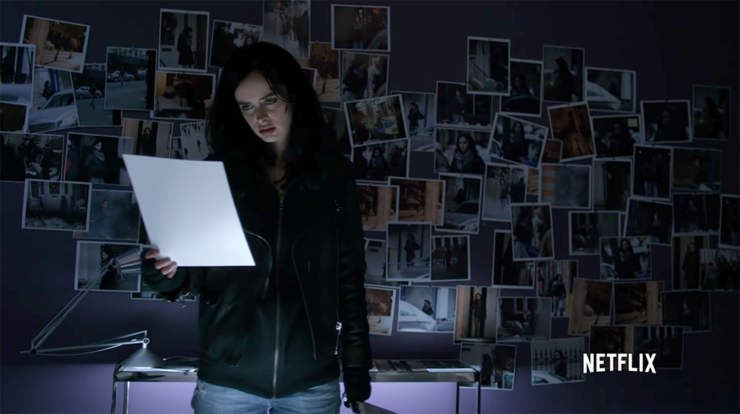
(Reviewed on this site by Tansy Rayner Roberts)
The Good: Everything. Seriously, this is about as flawless a season of television as you’ll find anywhere. It’s a brilliant examination of gaslighting and sexual harassment, of rape culture, of empowerment, and of addiction in general and alcoholism in particular. Krysten Ritter was born to play Brian Michael Bendis and Michael Gaydos’s creation, Rachael Taylor is brilliant as Trish (her character also serves as a superb study of parental psychological abuse), Mike Colter gives us a smoldering, intense Luke Cage, and David Tennant gives the greatest performance of his career to date (caveat: I’ve not yet watched Good Omens) as Kilgrave.
The Bad: For the second season in a row we get a sympathic African-American character killed off for no compellingly good reason. Both Ben Urich’s death in DD season one and especially the death of Detective Clemons, played by the great Clarke Peters, in this season are gratuitous as hell, and given the dearth of black characters, is a really bad look.
The Ugly: Not really this season’s fault, but so brilliant a debut is a really tough act to follow…
Daredevil season two
March 2016
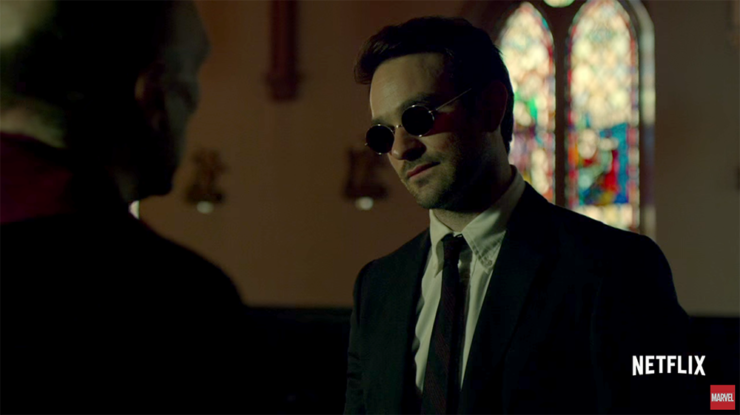
(Reviewed on this site by Tansy Rayner Roberts)
The Good: The introduction of the Punisher is magnificently handled—so much so that Netflix amended their plans in order to add a spinoff series starring Frank Castle to the slate, which lasted two seasons. A brilliant look at DD’s influence on the people of New York, and a really good study of vigilantism, with a level of depth that the cinematic versions—who only tell two-to-three-hour stories at a time—don’t really have time to get into.
The Bad: While Elodie Yung is perfect as Elektra and Scott Glenn even more so as Stick, this half of the plot falls down in every way. In 1982 when Frank Miller and Klaus Janson introduced ninjas and their version of Asian mysticism into Daredevil, it had a tinge of the exotic about it, and it was something new. Thirty-five years later, it’s tired and not that interesting, and is just a lot of sound and fury signifying very little.
The Ugly: One of the best things about season one was the dynamic among Matt, Foggy, and Karen. So why spend the second season with the three of them separated most of the time? To make matters worse, their portrayal of Karen’s reporter career is, um, not what journalism is like…
Luke Cage season one
September 2016
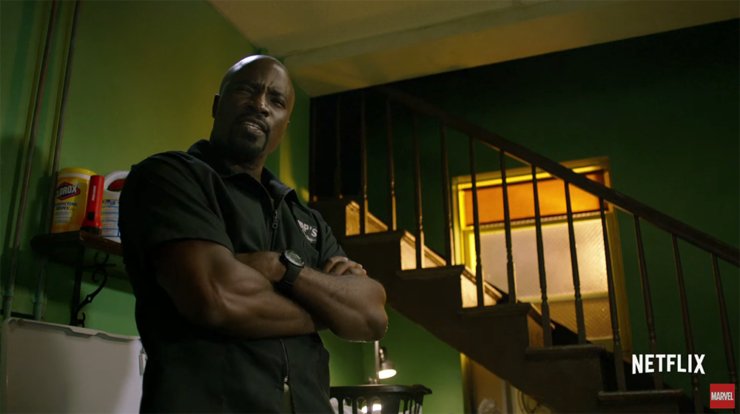
(Reviewed on this site by Monique Jones)
The Good: This show embraced Harlem the way The Wire embraced Baltimore, the way Republic of Doyle embraced Newfoundland, the way Bloodline embraced the Keys. The show had a great energy, a stellar use of music, and a phenomenal lead in Mike Colter. One of the things I like about Colter’s Cage is that he’s the only one of the Netflix heroes with a purity of purpose. (Well, okay, Frank Castle does, too, but that’s an impure purity, as it were.) The others are all either reluctant or have too much baggage, but Cage just antes up and kicks in and helps the people of Harlem.
On top of that, Alfre Woodard, Theo Rossi, and especially the brilliant Mahershala Ali are phenomenal as the bad guys, and Simone Missick just nails Misty Knight.
The Bad: Both this season and Jessica Jones season one hint at a larger story behind the experiment that resulted in Cage’s powers, but it never comes together very well. And, like many of the Netflix series, the third quarter, as it were, is slow-moving and weak.
The Ugly: Killing Ali’s Cottonmouth and replacing him with Erik LaRay Harvey’s significantly less interesting Diamondback was just a wrong move on every conceivable level. Cottonmouth was a brilliant villain—choosing a best villain among him, Tennant’s Kilgrave and d’Onofrio’s Kingpin is a challenge—and killing him also did a lot to kill interest in the series.
Iron Fist season one
March 2017
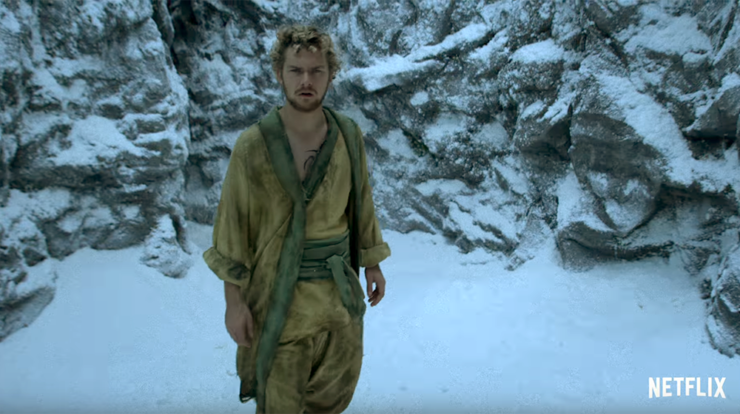
(Reviewed on this site by Keith R.A. DeCandido)
The Good: Jessica Henwick is superlative as Colleen Wing, as she has a great journey to go on, and Henwick plays her beautifully, realizing that she’s on the wrong side and working to fix it. Her early experimenting with MMA fighting is a bit of a weird detour, as it doesn’t actually go anywhere, but she’s otherwise amazing. Excellent work here also by Tom Pelphrey as Ward, Jessica Stroup as Joy, and Sacha Dhawan as Davos.
The Bad: I really don’t see how anyone could look at four decades of Iron Fist in the comics and conclude that the first season of his TV show should feel like an episode of Suits instead of an episode of Into the Badlands. Rand Meacham was always a minor background element of the comics, yet Rand Enterprises is the major driving force of the TV show, at the expense of K’un-L’un, which we see almost nothing of. Also David Wenham is awful, failing to make Harold Meacham compelling in any way.
The Ugly: Utterly disastrous casting of the lead, as Finn Jones a) has no martial arts skills whatsoever and b) is terrible. In a cinematic/TV universe that has given us great fight choreography with Captain America, the Black Widow, Daredevil, Black Panther, and Melinda May, to see the inept, incompetent fight choreography in the one that’s about a friggin martial artist is just depressing as all heck. Just as the Daredevil writers know nothing about lawyers or reporters in their story about lawyers and reporters, Iron Fist‘s scribes know nothing about martial arts or corporations in their story about a martial artist getting involved with a corporation. Unlike DD, though, the IF writers don’t give us a good story to ameliorate it.
The Defenders season one
August 2017
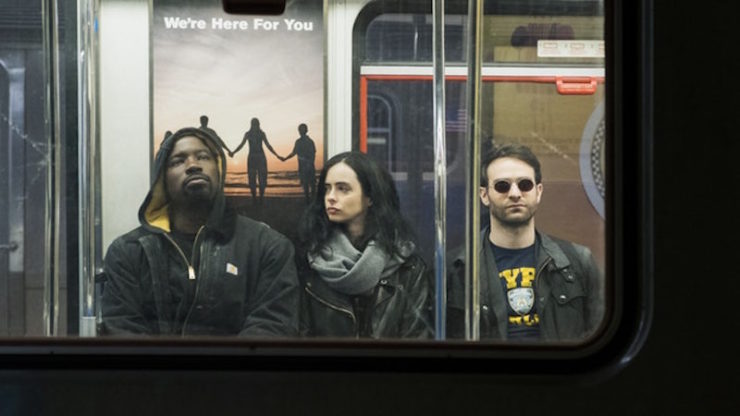
(Reviewed on this site by Keith R.A. DeCandido)
The Good: Brings in threads from all the previous seasons—plot stuff from Iron Fist and Daredevil, character stuff from all four shows—elegantly and intelligently. Keeps everyone in character while moving forward with the story. After a long progression of villains who are charismatic but tend toward explosive anger (Kingpin, Kilgrave, Cottonmouth, Mariah Dillard, Harold Meacham), Sigourney Weaver’s calm and serene Alexandra is a welcome change.
Also points for taking the disparate and seemingly contradictory bits of the Hand we’d seen on Daredevil and Iron Fist and making them actually make sense.
The Bad: The show doesn’t embrace New York the way the others do, a particular problem given that they’re trying to save the city. And just in general, the sense of urgency and danger is never entirely present, especially since the threat is, um, the bad guys have to take bones out of a hole. Oooh, scary….
The Ugly: Just as with Luke Cage season one, the bad guy is killed off prematurely and replaced with someone less interesting. Elodie Yung’s Elektra is great as a foil for Murdock, less so as a big bad endangering the city. (Madame Gao even points out how absurd it is for her to just take over Alexandra’s role when Alexandra had such a huge infrastructure in place, but the story then ignores that.)
The Punisher season one
November 2017
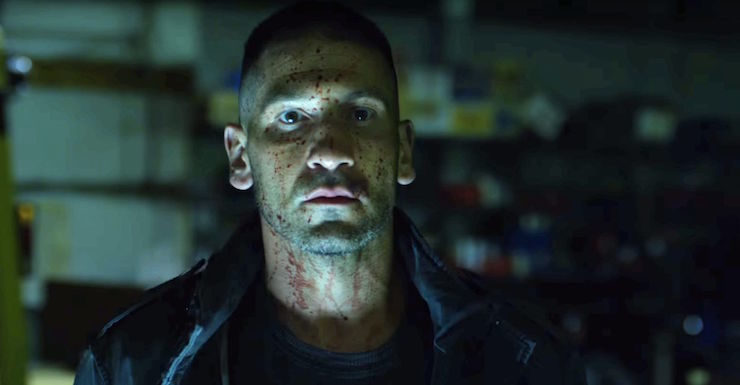
(Reviewed on this site by Keith R.A. DeCandido)
The Good: Jon Bernthal’s superlative performance in DD season two is brought into the lead role here, and he’s amazing, giving us a nuanced, complex Punisher. In particular, this series examines Frank Castle’s military background, which is usually only backstory in the comics. This entire season is a strong meditation on PTSD.
The Bad: After having his entire story arc set up at the end of DD season two—getting revenge on the people responsible for killing his family—they then dispense with that in the very first episode before the credits run, so they can instead do a story…
…where he gets revenge on the people responsible for killing his family. Okay, then.
The Ugly: Despite the fact that Castle was inspired by Daredevil, despite the presence of Karen Page (and other characters from the Netflix MCU), this series goes out of its way to pretend it doesn’t take place in a world of superheroes. This is especially problematic with the arguments about taking the law into your own hands, which would be very different in the MCU. It’s a blown opportunity.
Jessica Jones season two
March 2018
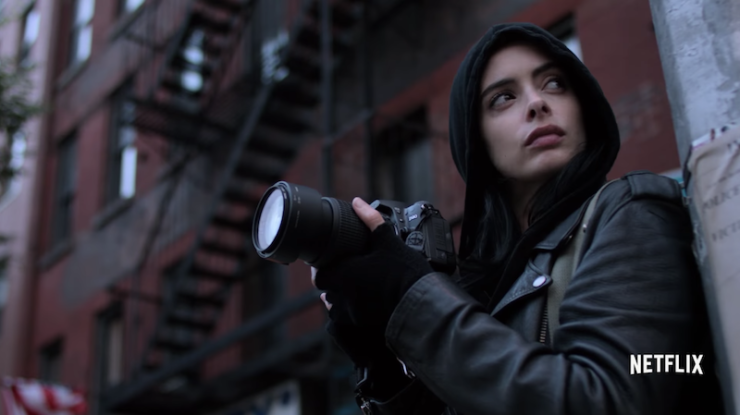
(Reviewed on this site by Tansy Rayner Roberts)
The Good: Does a fantastic job exploring more of the youth of both Jessica and Trish, with phenomenal performances by Krysten Ritter and Rachael Taylor, who knock it out of the park all season long. It’s as strong a meditation on addiction as Punisher season one’s was on PTSD, with all the characters being addicts to some degree or other. It’s also especially impressive to see Rebecca DeMornay’s Dorthy Walker doing as good a job of gaslighting and manipulating Trish as Kilgrave did Jessica last season, only Dorothy doesn’t even have super-powers.
Also Janet McTeer—whom I had the pleasure of seeing on stage in 2016 as Petruchio in an all-female production of The Taming of the Shrew—is superb as Jessica’s mother.
The Bad: This isn’t that bad, but the show suffers from comparison to the first season. I think it was a wise choice to have a less focused season without a single big bad—it’s more fitting for JJ’s noir tone in any case—and instead a bunch of small villains. But it doesn’t help that one of those small bads, Pryce Chang, is an idiot. (A waste of the great Terry Chen, that.)
The Ugly: Like Punisher, this show refuses to acknowledge its place as part of a larger universe—especially frustrating given that Luke Cage was introduced on this show. The back half of this season is all about how Jessica is the only one who can stop her mother and, well, she’s not. She’s got a bunch of new powered buddies! Why aren’t they at least mentioned?
Luke Cage season two
June 2018
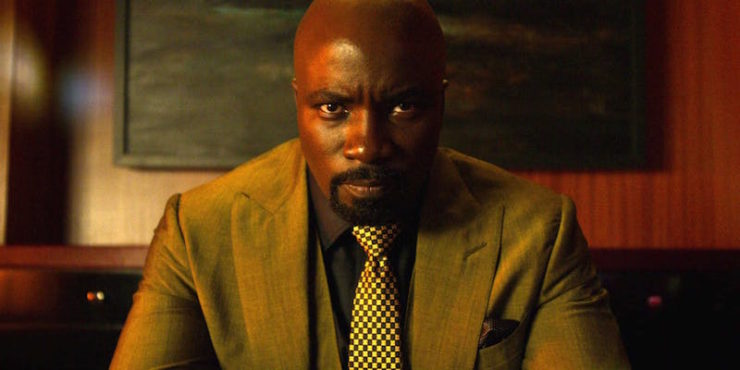
(Reviewed on this site by Keith R.A. DeCandido)
The Good: Everything. Second only to JJ season one in its excellent mix of pace, characterization, and compelling bad guy. Watching Cage’s progression from can-do-no-wrong hero to being beaten by Bushmaster (played with verve and tremendous charisma and physicality by Mustafa Shakir) to eventually being posthumously manipulated by Mariah Dillard into taking over Harlem’s Paradise is magnificent, and the season gives us tons of room for character development of Cage, Shades, Comanche, the Dillard family, Bushmaster, and Misty Knight. On top of that, we get actual use of the expanded universe, as Jessica Henwick, Finn Jones, and Elden Henson all put in strong appearances as Colleen Wing, Danny Rand, and Foggy Nelson, respectively, all to good effect.
And then we have Reg E. Cathey—in unfortunately one of his final roles before his death—being his usual brilliant self as Cage’s Dad.
The Bad: The writing sometimes suffers from a bit too much repetition—there are several occasions where characters have the same conversation over and over again. Also, they can’t come up with a good reason for Danny Rand to not be around after his one-episode appearance beyond “we only contracted you for the one episode, Finn, sorry.”
The Ugly: The third season was in the midst of being developed when Netflix cancelled this series that was so incredibly popular that its first season shut down Netflix for a while because so many people wanted to watch it. I can live with the other series ending where they did, as they all at least came to a decent conclusion. Cage though was a) demonstrably popular (Netflix may not release actual viewership numbers, but, again, Cage friggin broke Netflix) and b) left hanging on a serious cliffhanger. That we’re not getting a third season is malpractice of the highest order.
Iron Fist season two
September 2018
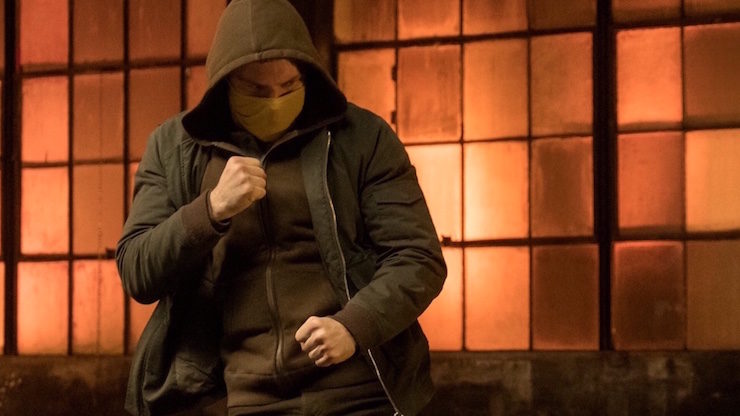
(Reviewed on this site by Keith R.A. DeCandido)
The Good: This is part Iron Fist season two and part the backdoor pilot for a Daughters of the Dragon series that, sadly, we will never see. Misty Knight and Colleen Wing are long-established partners in the comics, and—after being teased with it in The Defenders and Luke Cage—we finally get that team-up in this season, and Simone Missick and Jessica Henwick are amazing.
We also finally get a look at K’un-L’un in flashback—it’s not enough, but it’s something, and it’s also some of the best stuff in the series. And there’s only one scene in Rand and it’s Ward leaving! The only focus there is on the surviving Meacham family, which is played brilliantly by Tom Pelphrey and Jessica Stroup.
The Bad: Finn Jones is still awful. He’s better in this season than he was in The Defenders, which was, in turn, better than he was in season one, but he’s still very much not good. Also, as good as Alice Eve is as Mary Walker, the character just feels like she wandered in from another show and doesn’t seem to serve much purpose.
The Ugly: Sacha Dhawan—after being one of the best things about season one—is a total, one-dimensional disaster as the big bad of season two.
Daredevil season three
October 2018
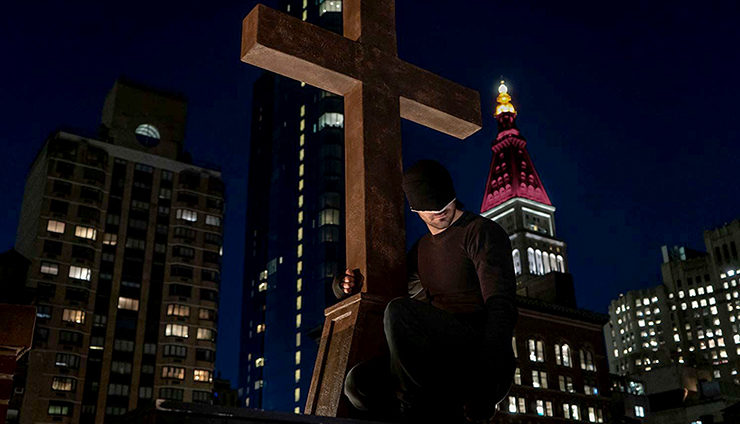
(Reviewed on this site by Leah Schnelbach)
The Good: This is a decent adaptation of the “Born Again” storyline from the comics, complete with the introduction of Sister Maggie, played with verve and panache by Joanne Whalley. After keeping Matt, Foggy, and Karen separate for season two to ill effect, they’re back together as a team again here, and it’s glorious. And Vincent d’Onofrio is never not amazing.
The Bad: Once again, we get a season that refuses to acknowledge its place as part of a larger set of stories. At no point after he comes back from the seeming dead does Murdock contact the other Defenders, even though he asked them to guard the city after he was gone. At no point does he ask any of them for help. Worse, at no point after DD is declared public enemy #1 after being framed by Bullseye do any of those heroes show up to try to stop him. (It would’ve been so cool to see Jessica Henwick with her shiny new iron-fist-powered sword go after Murdock.) And when Fisk invites the criminal bigwigs of the city to his wedding, where’s Cage?
The Ugly: I didn’t buy for a single solitary second that the Wilson Fisk that we first met in season one of DD was this all-powerful crime boss with tons of federal law-enforcement personnel in his pocket. It’s the problem with adapting comics with so much history—when you do it right, you distill five decades of stories into a single storyline; when you do it wrong, you compress five decades of stories into a single storyline. Season three of DD is the latter, sadly. The Kingpin of the “Born Again” comics story had been around for ages, first as a Spider-Man villain, then as a Daredevil villain. But the Kingpin of Netflix has only been around for six-and-a-half seconds, and the corrupt real-estate mogul of season one is incompatible with the Kingpin of Crime of season three.
The Punisher season two
January 2019
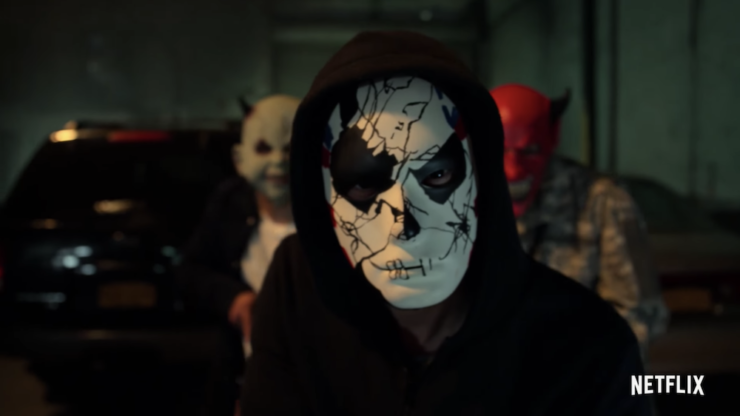
(Reviewed on this site by Keith R.A. DeCandido)
The Good: Jon Bernthal remains excellent, having a strong, relaxed chemistry with everyone he stands next to, from his doomed relationship with Alexa Davalos’s Beth to his weird mentor relationship with Giorgia Whigham’s Amy/Rachel to his military bond with Jason R. Moore’s Curtis to his consistent great relationship with Deborah Ann Woll’s Karen. And he’s surrounded by an excellent cast—besides those listed above, there’s Amber Rose Revah’s superb Madani, Royce Johnson continuing his recurring role as Detective Mahoney, Cecilia Antoinette’s snarky bank manager, and the fantastic Joe Holt and Brandon Gill as the sheriff and deputy who defend Castle and Amy from a siege.
The Bad: Again, no acknowledgment of the larger universe they’re in, which is particularly frustrating when Castle comes back to town and there’s no response from any of the other New York heroes. Even leaving that aside, Mahoney’s experiences with corrupt feds in DD season three should’ve come up in his dealings with Madani.
The Ugly: The pacing is a disaster, the story is all over the place, and the two plot threads have nothing to do with each other. Each one intrudes on the other to ill effect. Plus, while Ben Barnes was a great Russo in season one, he’s a dreadful Jigsaw in season two, especially since he’s not nearly as scarred as the script says he is, plus his plot-convenient amnesia is utterly unconvincing and cheap.
Jessica Jones season three
June 2019
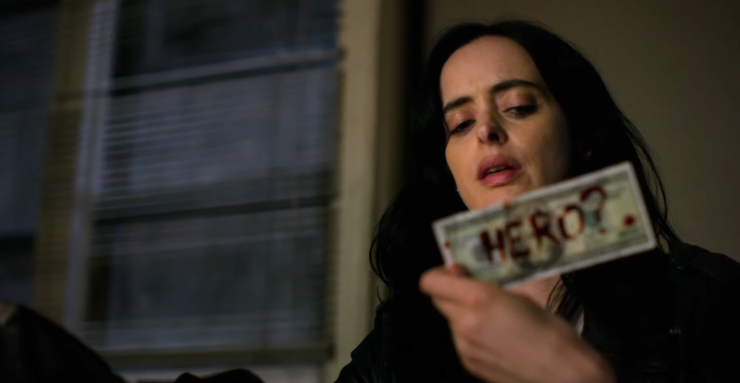
The Good: The first season was about sexual assault, the second season was about addiction, and the third season is about heroism. Trish’s attempt at it—as she finally becomes Hellcat, though she’s never named that (except in the title of one episode)—in particular shows how blurry the line is between hero and villain and how easy it is to go too far.
As an added bonus, the final episode gives us a Luke Cage cameo, and Mike Colter’s presence is extremely happy-making—though it’s a bit bitter, knowing that his planned third season will never be.
The Bad: At no point during the references to Trish—called, simply, “the masked vigilante”—does anyone ever mention Daredevil (who’s been protecting Hell’s Kitchen, and who also was believed to be a murderer in his recent third season) or Iron Fist (either Danny Rand or Colleen Wing, both of whom have been active in Chinatown) or Cage (at least until the last episode) or the Punisher (who also has killed while wearing a costume) or, for that matter, Spider-Man or the Avengers. It’s maddening, and it makes a lot of the moralizing about super-powered heroism feel incomplete.
The Ugly: After establishing itself as the place for strong villains—Fisk, Kilgrave, Cottonmouth, Mariah, Alexandra, Madame Gao, Bushmaster—the Marvel Netflix series ends with the lamest, most stultifying villain ever. The notion of an incredibly smart normal person who ticks all the MRE/incel boxes has potential, but as written and as boringly played by Jeremy Bobb, Gregory Sallinger is a low-watt disaster. What’s especially frustrating is the number of stupid mistakes he makes, which belie someone who has managed to keep eight murders hidden.
The Netflix corner of the MCU was a maddening mix of brilliant and frustrating, some great performances and superlative villains mixed with inconsistent plotting and severe pacing issues. Both The Defenders season one and Iron Fist season two had fewer than thirteen episodes, and they both benefitted from it, and the other series might have taken a chapter from that. Hell, dividing The Punisher season two into separate, shorter seasons would’ve done both the Russo and Pilgrim storylines a world of good—ditto Daredevil season two with the Punisher and Elektra plots.
To me, what was most frustrating is that, while Daredevil, The Punisher, and Jessica Jones all had a certain strong finality to them, both Luke Cage and Iron Fist left their sophomore seasons with fascinating promise for future storylines (Rand and Ward in Asia exploring the iron fist, Colleen Wing fighting in NYC with here iron-fist-powered katana, the promise of the Daughters of the Dragon, Cage trying to keep Harlem safe while trying to not be lured to the dark side), and that we won’t get to see that is supremely maddening.
Hilariously, one of the things that makes the movie side of the MCU so powerful is that Kevin Feige has adopted the television model for producing movies, but the actual TV shows haven’t done what Feige and his gaggle of writers and directors have managed, which is embrace the continuity. So much of the texture of The Punisher‘s two seasons, of Daredevil‘s third and Jessica Jones‘s second and third seasons would’ve been improved by more cross-pollination, even if it was just ideas and mentions, not necessarily guest appearances. The continuity provided by Rosario Dawson’s Claire Temple in the early days was sorely missed in the latter days.
Still, these were worthy TV shows (well, except Iron Fist) and deserved to continue (even Iron Fist). It’s a true shame that we won’t get more.
Keith R.A. DeCandido has been rewatching every single live-action movie based on a superhero comic book each Friday here on Tor.com, and has also written about Star Trek, Stargate, Batman, Doctor Who, and (now for the last time) the Marvel Netflix series, and much more here since 2011. His latest novels are A Furnace Sealed, an urban fantasy set in the Bronx, Mermaid Precinct, the fifth novel in his fantasy police procedural series, and Alien: Isolation, based on the classic movie series and the hit videogame. He also has short stories in the new anthologies Thrilling Adventure Yarns, Footprints in the Stars, and Brave New Girls: Adventures of Gals and Gizmos.










